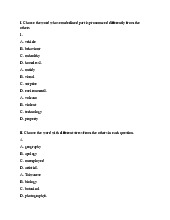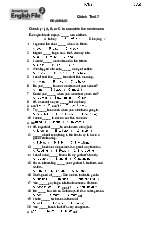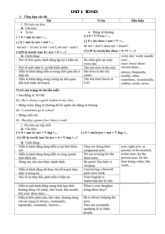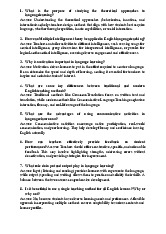



















Preview text:
lOMoAR cPSD| 59540283 Anh Ngữ TalkFirst
_____________________________________________________________________
TỔNG HỢP BÀI MẪU IELTS WRITING TASK 1
1. Bài mẫu IELTS Writing Task 1 chủ ề “con ngựa” – Tháng 3/2021
The diagrams below show the development of the horse over a period of 40 million
years. Summarise the information by selecting and reporting the main features, and
make comparisons where relevant. Bài mẫu:
The infographic demonstrates the evolution of the horse over a period of 40 million years.
Overall, the linear transformation process of the horse can be categorized into 3 main
stages of development, based on the physical characteristics. Also, the foot structure
has gone through very fundamental modifications from spread-out toes to a single hoof.
Regarding changes to the body, 40 million years ago, the Eohippus had some very
primitive features such as a hairless back and an undeveloped small body. After 10 lOMoAR cPSD| 59540283 Anh Ngữ TalkFirst
_____________________________________________________________________
million years, it transformed into the Mesohippus, whose body had become bigger
with a longer face, back, limbs, tails. It is also noticeable that it had also developed
some form of a mane. These attributes continued to be enhanced further in the next 15
million years when the animal was called Meryhippus. Finally, the physical
appearance of the modern horse has remained more or less the same, with its body
parts becoming more evolutionarily advanced. Specifically, both the mane and the
hind legs are bigger, while the face, the back, and the tail become more defined.
Considering changes around the foot structure, the Eohippus, found 40 million years
ago, had small and short limbs, which were forked into four smaller jointed toes at the
end. These toes had been shortened and reduced to three in the middle evolution
stages, called Mesohippus and Merychippus. Especially, the tip of the biggest toe
bone in the middle started to show some more growth in size, creating a symmetrical
structure with the middle toe protruding to the front. The ultimate form of a horse’s
foot involves its toes being completely replaced by a single hoof.
273 words – Band 8.0+ – Written by TalkFirst! Từ vựng:
● Infographic (n): biểu ồ thông tin
A picture or diagram or a group of pictures or diagrams showing or explaining information.
● Linear (adj): diễn tiến theo trình tự
Involving a series of events or thoughts in which one follows another directly.
● Fundamental (adj – C2): cơ bản Very important and basic.
● Spread-out toes (n): ngón chân tách rời Toes that are separate from each other.
● Hoof (n): móng (ngựa, hưu, nai…) lOMoAR cPSD| 59540283 Anh Ngữ TalkFirst
_____________________________________________________________________
The hard part on the bottom of the feet of animals such as horses, sheep, and deer.
● Primitive (adj – C1): sơ khai
Of or typical of an early stage of development; not advanced or complicated in structure.
● Mane (n): bờm (ngựa, sư tử…)
The long, thick hair that grows along the top of a horse’s neck or around the face and neck of a lion.
● Attributes (n – C2): phẩm chất hoặc ặc tính
A quality or characteristic that someone or something has.
● Evolution (adverb: evolutionarily): quá trình thay ổi và phát triển A gradual
process of change and development. ● Hind legs (n): chân sau
Legs at the back of an animal’s body.
● Defined (adj): hoàn thiện, có ường nét rõ rệt
Used for talking about something that has clear edges or a clear shape, so that it is easy to see.
● Forked (adj): chia thành hai hoặc nhiều nhánh To divide into two or more parts.
● Jointed (adj): có khớp, cử ộng bằng khớp Having joints and able to bend.
● Symmetrical (adj): ối xứng
Involving actions or parts that are similar or balanced in some way. ● Protruding (adj): nhô ra
To stick out from or through something. lOMoAR cPSD| 59540283 Anh Ngữ TalkFirst
_____________________________________________________________________
2. Bài mẫu IELTS Writing Task 1 ngày 24-04-2021
The pictures below show Bell Hill farm in 1976 and the changes that took place in
2006. Summarize the information by selecting and reporting the main features and
make comparisons where relevant. Bài mẫu:
The maps illustrate the layout of Bell Hill Farm in 1976 and its transformation into an Environment Centre in 2006.
Overall, it is apparent that this area underwent major changes to be repurposed into
the Environment Centre, with the sole facility left intact being the farmhouse. lOMoAR cPSD| 59540283 Anh Ngữ TalkFirst
_____________________________________________________________________
In 1976, the only access to the area was a road running from North to South which
bifurcated at the Southern end. Towards the North-western corner of the farm was a
warehouse for farm machinery, while a barn that stored corn and other agricultural
produce was placed in the North of the farmyard. There was also a farmhouse
standing in the South with a chicken coop nearby and some cowsheds could be
spotted in the North-eastern area.
30 years later, while the road and the farmhouse remained unchanged, the other
facilities experienced considerable alterations to become the Environment Centre. In
detail, the warehouse in the North-west was converted into a car park, whereas in the
North, a multimedia room was built, totally replacing the old barn. The cowsheds and
the chicken coop were removed in order to make room for a large building for student
housing. Another change that took place was the addition of a recreation area in the centre of the old farmyard.
211 words – Band 8.0+ – Written by TalkFirst! Từ vựng:
● Agricultural (adj): (thuộc) nông nghiệp
Connected with the science or practice of farming.
● Farmyard (n): Sân của trang trại
An area that is surrounded by farm buildings. ● Cowshed (n): Chuồng bò
A farm building in which cows are kept.
● Unchanged (adj): Không bị thay ổi
That has stayed the same and not changed.
● Multimedia (n): Đa phương tiện
The combined use of media such as television, slides, etc., esp. in education.
● Barn (n): chuồng trâu bò, chuồng ngựa
A large farm building for storing grain or keeping animals in. lOMoAR cPSD| 59540283 Anh Ngữ TalkFirst
_____________________________________________________________________
3. Bài mẫu IELTS Writing Task 1 – 08/05/2021 – Dạng Bar
charts có nhiều ối tượng
The bar chart below shows the number of visitors to four London museums.
Summarize the information by selecting and reporting the main features, and make comparisons where relevant. Bài mẫu:
The bar chart compares the number of visits to four museums in London in five
different months, namely June, July, August, September, and December. It is clear that
the British Museum almost always led in popularity, whereas the National Museum
was the least prevalent choice for visitors in these months. In addition, visitor
numbers fluctuated over time, with August seeing the highest visitor volume in all
these sites apart from the Science Museum. lOMoAR cPSD| 59540283 Anh Ngữ TalkFirst
_____________________________________________________________________
In the first two months, there were hardly any changes in the popularity of the four
places as the History Museum, the British Museum and the Science Museum received
about 400,000 visits each, while visitor numbers to the National Museum hovered around 200,000.
However, the remaining months witnessed more remarkable changes, with the figures
for the History Museum, the British Museum, and the National Museum soaring in
August to peak at 600,000 visits, roughly 710,000 visits and slightly above 300,000
visits, respectively, before dropping substantially in September and December.
Meanwhile, there was no change in the number of visitors to the Science Museum in
August, which was followed by a marked rise to a high of 500,000 in September and a
noticeable fall to merely 300,000 in December. It is worth noticing that visitor traffic
to both the History Museum and the National Museum was also lowest in the last
month, at only 200,000 visits, more or less.
239 words – Band 8.0+ – Written by TalkFirst! Từ vựng:
● To lead in popularity: dẫn ầu về mức ộ phổ biến.
● To be the least prevalent choice: là lựa chọn kém phổ biến nhất.
● There were hardly any changes: gần như không có sự thay ổi nào.
● To hover around: ứng gần với 1 giá trị.
● Merely (trạng từ): dùng tương tự như “only” – ể nhấn mạnh một giá trị/ con số
nhỏ trong trường hợp của bài này.
● Visitor traffic (danh từ): lưu lượng khách tới một ịa iểm hoặc lưu lượng truy cập một website. lOMoAR cPSD| 59540283 Anh Ngữ TalkFirst
_____________________________________________________________________
4. Bài mẫu IELTS Writing Task 1 “Cây cầu – The bridges”
siêu khó – Đề computer-delivered tháng 05/2021
The three pictures below show three different kinds of bridges. Summarize the
information by selecting and reporting the main features and make comparisons where relevant. lOMoAR cPSD| 59540283 Anh Ngữ TalkFirst
_____________________________________________________________________ Bài mẫu:
The pictures compare the distinctive architectural and structural designs of three
variations of bridge. Clearly, the number of piers as well as the allowed mode of
maritime transportation of each bridge type varies, depending upon the topographical features of the sites.
To start with, the arch bridge, shaped as an upward curved arch, is a solid concrete
block with no piers across the lake, whereas the concrete girder bridge, which vaults lOMoAR cPSD| 59540283 Anh Ngữ TalkFirst
_____________________________________________________________________
over the river, has a changeable number of pillars being proportional to the desirable
length. Meanwhile, the suspension bridge is constructed with only two big and sturdy
piers rooted into underwater cliffs near the seaport.
Concerning the technical requirements, these bridge designs hold striking differences.
First, the arch bridge, with a limited length of 200 meters, has its abutments anchored
to either side of a lake, whilst the concrete girder bridge has its columns positioned at
a maximum distance of 200 meters from each other, making the suspension bridge the
one with the longest span of up to 2000 meters. In addition, the overhead clearance
makes them strictly exclusive to certain types of transport. Specifically, this figure for
the arch bridge and the concrete girder bridge is 100 meters and 300 meters,
respectively, so that small-sized and middle-sized ships can safely sail under them.
Noticeably, the water level at the place where a suspension bridge is erected, usually
very deep, helps to accommodate the operation of large-sized ships.
240 words – Band 8.0+ – Written by TalkFirst! Từ vựng:
● Distinctive (adj – C1): khác biệt
● Architectural (adj – C1): thuộc kiến trúc
● Variations (n – B2): biến thể, loại
● Mode (n – C1) of maritime (adj – C2) transportation (n – B2): các loại hình giao thông ường thủy
● Topographical features (noun phrase): ặc iểm ất ai
● Solid (B2): ặc, không rỗng
● Vault over (verb phrase – figurative speech): vươn qua lOMoAR cPSD| 59540283 Anh Ngữ TalkFirst
_____________________________________________________________________
● Proportional to (adj phrase): tương ứng với
● Desirable (adj – B2): như mong muốn
● Constructed (verb – B2): xây dựng
● Sturdy (adj): vững chãi
● Rooted into (verb phrase – B2): cắm sâu vào
● Technical requirements (collocation – B2): yêu cầu kỹ thuật
● Striking differences (Noun phrase – C1): iểm khác nhau nổi bật
● Abutments (n): trụ cầu (xây ở hai ầu cầu)
● Anchored to (verb phrase – C2): móc, neo, gắn chặt vào ● Columns (B2): cột
● Span (n – C1): nhịp cầu
● Overhead clearance (n – C2): khổ thông thuyền
● Exclusive to (preposition phrase – C1): chỉ thích hợp với, chỉ dành riêng cho
● Erected (V – C1): xây dựng, dựng lên
● Operation (N – C1): hoạt ộng, vận hành lOMoAR cPSD| 59540283 Anh Ngữ TalkFirst
_____________________________________________________________________
5. Bài mẫu IELTS Writing Task 1 chủ ề “Quy trình sản xuất
len – Wool production” siêu khó tháng 06/2021
The picture shows the process of making wool. Summarise the information by
selecting and reporting the main features, and make comparisons where relevant. Bài mẫu: lOMoAR cPSD| 59540283 Anh Ngữ TalkFirst
_____________________________________________________________________
The diagram illustrates how wool is produced for both personal and industrial use.
Generally, it is clear that there are various steps involved, beginning with the sheep
being sheared and ending with the woolen yarns being knitted or woven into
commercially made jackets and carpets.
The process commences when the sheep are sheared for their fleece. Once the
collective amount of fleece is cleaned with water and chemicals to get rid of
contaminants such as grease, twigs, dried sweat, and other debris, it is taken to a
drying machine. Following this, the fleece is carded, which results in tufts of wool and
pieces of string as byproducts, with the latter being reintroduced into the process to maximize productivity.
Then, woolen tufts are sent to a warehouse for storage before being spun into balls of
yarn. In the last stage, these yarn balls are sold for either individual pastimes, like
knitting, or the commercial purpose of making jackets or carpets.
159 words – Band 8.0+ – Written by TalkFirst! Từ vựng:
● Shear (v): xén lông cừu ● Weave (v): dệt
● Fleece (n): bộ lông cừu
● Collective amount (n): lượng tổng hợp
● Contaminant (n): tạp chất ● Grease (n): dầu mỡ
● Twig (n): nhánh cây nhỏ
● Dried sweat: mồ hôi khô ● Debris (n): mảnh vụn ● Card (v): chải len ● Tuft of wool: búi len ● String (n): sợi, thớ lOMoAR cPSD| 59540283 Anh Ngữ TalkFirst
_____________________________________________________________________
● Byproduct (n): sản phẩm phụ trong quá trình sản xuất
● Reintroduce (v): ưa vào lại ● Spin (v): quay sợi
● Ball of yarn (n): cuộn len
● Pastime (n): trò giải trí
● Commercial purpose (n): mục ích thương mại
6. Bài mẫu IELTS Writing Task 1 ngày 20/05/2021 dạng Maps
The maps below show the changes in the art gallery ground floor in 2005 and the
present day. Summarize the information by selecting the main features, and make comparisons. lOMoAR cPSD| 59540283 Anh Ngữ TalkFirst
_____________________________________________________________________ Bài mẫu:
The maps reveal some changes taking place to the layout of an art gallery’s ground
floor between 2005 and the present day.
In general, while the eastern part of the gallery has remained more or less intact over
time, the opposite side has undergone significant transformations, with the whole area
becoming more accessible for the disabled.
Originally, the gallery was designed merely for its exhibition purpose and visitors
could enter the hall through the entrance in the south of the building. Inside the hall,
there was a reception desk to welcome visitors, which led to a staircase in the north
end. The remaining part simply consisted of functional areas with a set of 3 exhibition
rooms on the eastern wing, one large exhibition space together with an office taking
up the entire southwestern corner, and a café in the northwest.
At present, the location has become modernized and versatile, providing more
facilities for visitors, especially with the addition of a wheelchair slope right outside
the entrance to the west and a lift next to the stairs. To the west, exhibition room 4 was
converted into a children’s indoor playground and one smaller room for temporary
display, while a gallery shop and a vending machine were opened in place of the
original gallery office and the cafe. The final alteration that happened was the
relocation of the reception towards the entrance of the gallery.
234 words – Band 8.0+ – Written by TalkFirst! Từ vựng:
● Layout (N – C1): bố cục
● Intact (Adj – C1): nguyên vẹn
● Transformation (N – C1): sự biến ổi hoàn toàn
● Accessible (Adj – C1): có thể tiếp cận lOMoAR cPSD| 59540283 Anh Ngữ TalkFirst
_____________________________________________________________________
● Merely (Adv – C1): chỉ duy nhất (giống only)
● The eastern wing (N – B1): chỉ khu vực cánh phía ông của một tòa nhà
● Entire (Adj – B2): hoàn toàn
● Versatile (Adj – C2): a năng, linh hoạt
● Convert into (V – B2): chuyển ổi thành
● In place of (Phrase – B2): thay cho cái gì
● Alteration (N – C1): sự thay ổi
7. Bài mẫu IELTS Writing Task 1 ngày 12/06/2021
The diagram details the process of making clothes from plastic bottles. Summarize the
information by selecting the main features, and make comparisons. lOMoAR cPSD| 59540283 Anh Ngữ TalkFirst
_____________________________________________________________________ Bài mẫu:
The picture illustrates the process in which plastic bottles are transformed into clothes.
Overall, it is apparent that there are three main stages involved in this recycling
process, including the collection and classification of plastic bottles, the preparation
for plastic pieces and the production of clothes.
At the beginning, used plastic bottles of different sizes are gathered before being
loaded onto trucks and transported to the factory. There, as soon as the bottles are lOMoAR cPSD| 59540283 Anh Ngữ TalkFirst
_____________________________________________________________________
sorted out, they are shredded into minuscule pieces. These pieces are then washed and
left in the sun to dry for 10 hours.
Following this, once the plastic pieces are dry, they are put in a boiling machine, after
which the water is strained off, resulting in melted plastic. At this point, the melted
plastic is spun into flexible yarn which is later woven into fabric. The final stage is
when the fabric is neatly rolled up and ready to be made into garments.
158 words – Band 8.0+ – Written by TalkFirst! Từ vựng:
● Transform into = Turn into = Convert into something: biến ổi thành cái gì ó
● Classification (n): sự phân loại
● Be of different/various sizes: có kích thước khác nhau ● Sort out: phân loại
● Shred (v): cắt nhỏ, xé nhỏ
● Minuscule (adj): rất nhỏ
● Spin (v): tạo ra sợi chỉ ● Roll up: cuộn lại
● Yarn (n): sợi chỉ dùng ể an, dệt, may vá ● Fabric (n): vải
● Garments (n) = clothes: quần áo
8. Bài mẫu IELTS Writing Task 1 ngày 19/06/2021
The table below shows daily oil production in 4 countries from 2000 to 2004. lOMoAR cPSD| 59540283 Anh Ngữ TalkFirst
_____________________________________________________________________ Bài mẫu:
The table compares the number of barrels of oil produced in a single day in four
African countries, namely Nigeria, Chad, Congo, and Somalia between 2000 and
2004. As can be seen, all countries witnessed an upward trend in their daily oil output,
except for Congo. Noticeably, despite seeing the most rapid growth rate over 5 years,
Chad remained one of the two smallest producers.
To begin with, there was a switch in ranks between Nigeria and Congo whose daily oil
volume far outnumbered the other countries’. In 2000, Congo led in production, at
275,000 barrels whereas Nigeria only made 205,000 barrels per day. However, in
2004, Nigeria overtook Congo to rank first with 213,000 barrels being produced in a
single day, 10,000 barrels more than the figure for Congo.
However, the daily oil production in the other two countries was insignificant.
Specifically, 5000 barrels was the figure for Somalia in 2000, which then saw a steady
rise until 2004 when it grew more than two-fold to reach 50,000 barrels per day. As lOMoAR cPSD| 59540283 Anh Ngữ TalkFirst
_____________________________________________________________________
for Chad, not until 2003 did this country record its very first 8000 barrels of crude oil
produced on a daily basis and this amount surged to finish at an equal level of
production to Somalia’s in the last year.
218 words – Band 8.0+ – Written by TalkFirst! Từ vựng:
● oil output (noun): sản lượng dầu
● a switch in ranks (noun): sự thay ổi về vị thế
● oil volume (noun): sản lượng dầu
● outnumber (verb): cao hơn về mặt giá trị, lượng, số lượng.
● to lead in production (verb): dẫn ầu về sản xuất
● overtake (verb): vượt qua về mặt giá trị và chiếm lấy vị trí của ai/ cái gì. ● record (verb): ghi nhận ● surge (verb): tăng vọt
● level of production (noun): mức ộ sản xuất/ sản lượng.
9. Bài mẫu IELTS Writing Task 1 dạng Process - Sand dunes diagram
The diagrams below show how sand dunes are formed.



